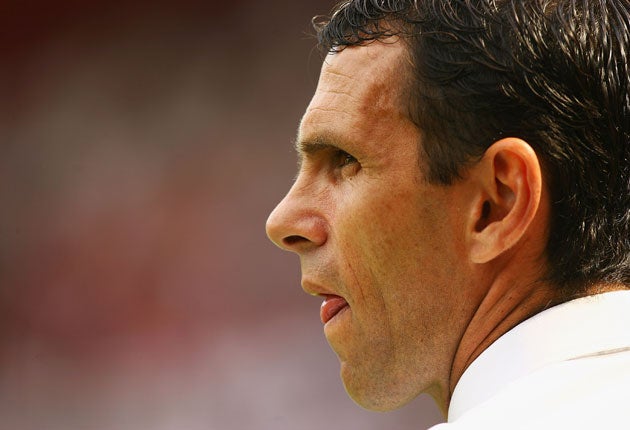The bright and beautiful game for pass master Poyet
Manager's stock is rising fast as his Brighton team combine success and style

Gus Poyet, the Brighton & Hove Albion manager, was enjoying the view from the top of League One in advance of yesterday's home match with Bournemouth. "People talk about the pressure now but being in the bottom four last February, that was pressure," he said. "We looked at the table and saw ourselves just about hanging in there. This is very enjoyable, to be honest."
In his 11 months in charge, the former Chelsea, Tottenham and Uruguay midfielder has transformed not only the fortunes of the Brighton team but also their style, which now reflects his own belief in passing and possession. Is he surprised by the success of his methods?
"We are in a very, very good situation, but if we had been thinking about being here, we imagined Sheffield Wednesday, Southampton and Huddersfield next to us, so the surprise is more about the other teams than about ourselves. The main thing is that we have continued the way we finished last year."
Summer reinforcements fitted the Poyet pattern: solid defenders and attacking players whose first instinct is to give the ball to a player in blue and white. And despite Poyet's Latin background, most of them came not from Spain or South America, but from Scunthorpe, Swindon and Swansea.
"I always think you need players that really know the division and players with a good character. And we kept players who played on loan for us and did well. They knew us, they loved the city and they wanted to stay here to play in the new stadium."
The 22,500-seat American Express Community Stadium will open next season, allowing the club, which has been homeless since 1997 after the Goldstone Ground was sold by a previous board, to tap the potential that regularly drew crowds of 25,000 in the 1970s. "It's looking amazing. I go past it every day, and every day you get happier about it. It will be a big change in the club's history. It's going to make it practically a new club, so I'm really looking forward to it."
Poyet's original contract was due to run out in June, but he and Tony Bloom, the chairman who bankrolled the new ground, agreed a four-year extension for Poyet and Mauricio Taricco, his assistant, last summer. "It took two minutes, and it means that I'm attached for the long term."
Many observers – and Poyet himself – were surprised his reputation had not led to offers from higher-placed clubs but since he has begun to prove himself, his name has been linked with any vacancy that has emerged. However, it would now take something special to prise him away from his project on the south coast.
"If it's something I couldn't refuse, even the chairman would say to me 'If you need to go, go'," he said. "But I won't say yes to just anything. I'm enjoying my time here, I think we can do better, we're playing the way I want, at the moment we're top. What more? Seriously, why? My aim, of course, is to manage at the top level, and that means the Premier League, or La Liga, or a national team. But I'm only 42, so I'm not in a hurry."
His first taste of solo management, after assisting Dennis Wise at Swindon and Leeds United, and Juande Ramos at Tottenham, has not put him off, even if it has been harder than he expected. "Harder, yes, no doubt, and much crazier," he said. "But it has been better, too. I don't think there is a better feeling for a manager than winning, first, but also seeing the team play the way you want. Just winning doesn't fully give you that feeling."
Poyet also has more than a passing interest in the England team's well-being now that his son Diego, a midfielder on Charlton's books, has been called into the Under-16 squad. He believes the national team must establish an identity.
"England doesn't need to say that the old English style is the only way we can play and we'll always go back to that," he said. "That happened to Uruguay for 60 years. We won the World Cup in 1950, and after that we always thought we could kick everyone and win again. But football changed completely and we couldn't cope with that, which is why we were so poor for 10 or 15 World Cups.
"Now the team has changed its mentality: 'We have players, we can play football, and if we are solid and have a style and a plan and we do it right, we can get to the top four.'
"So forget about 1966, think about what is best nowadays to win a football game with the players you have. And if the way is through technique, then work on technique. If it's long balls and second balls, play that way. But make a decision." If Poyet maintains his upward trajectory, it could, one day, be his decision to make.
Subscribe to Independent Premium to bookmark this article
Want to bookmark your favourite articles and stories to read or reference later? Start your Independent Premium subscription today.

Join our commenting forum
Join thought-provoking conversations, follow other Independent readers and see their replies